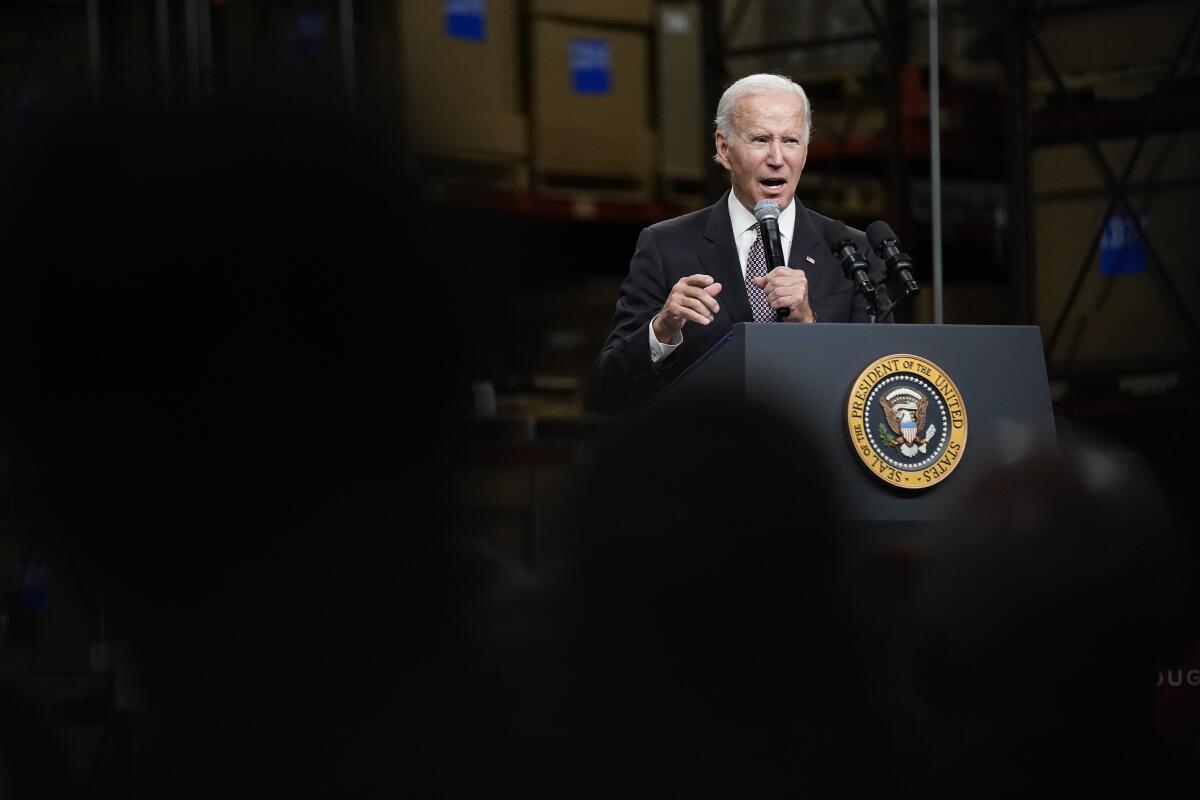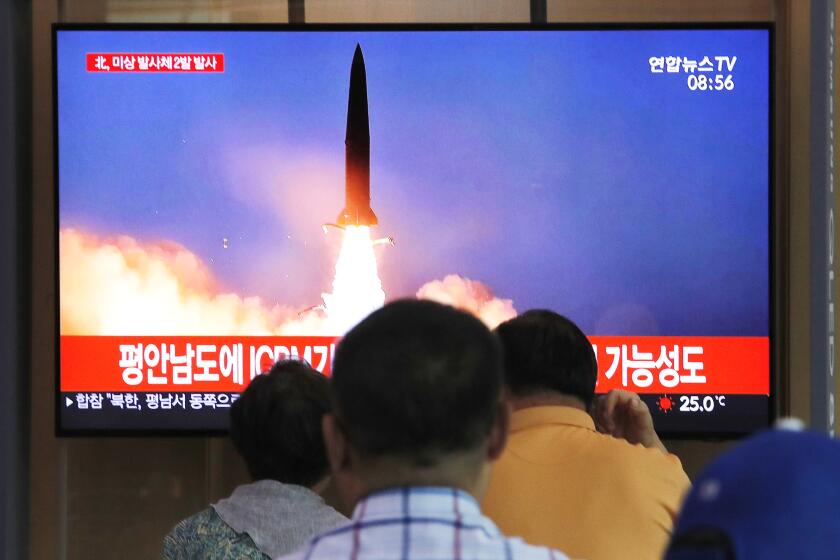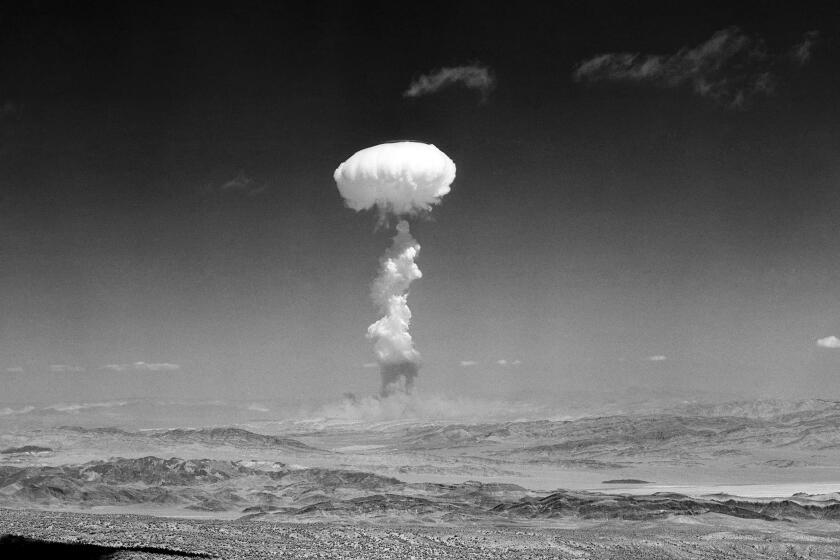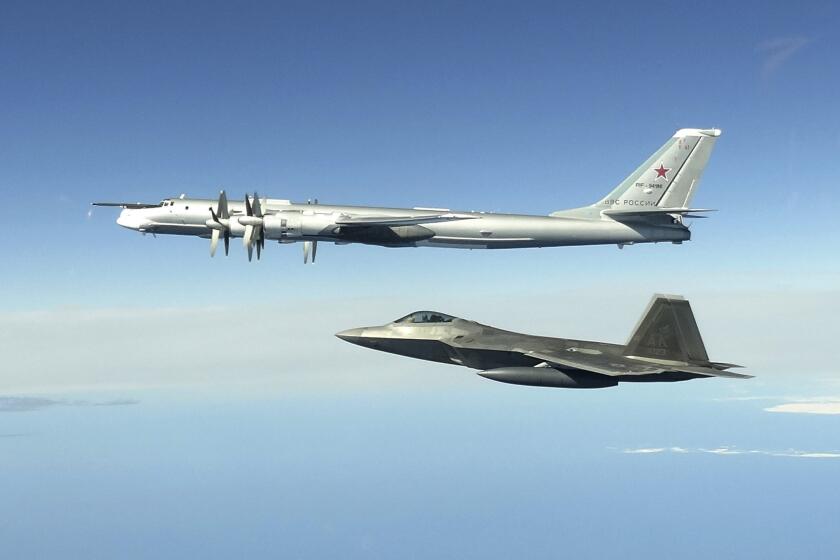Biden’s ‘Armageddon’ talk edges beyond the bounds of U.S. intelligence views

- Share via
WASHINGTON — President Biden’s warning that the world is at risk of nuclear Armageddon was meant to send an unvarnished message that no one should underestimate the extraordinary danger if Russia uses nuclear weapons against Ukraine, administration officials said Friday.
His grim assessment Thursday night at a Democratic fundraiser rippled around the globe and appeared to go beyond U.S. intelligence assessments. National security officials say they have no evidence that Vladimir Putin has imminent plans for a nuclear strike.
Biden discussed Ukraine after his standard fundraising remarks, saying Putin was “not joking when he talks about the use of tactical nuclear weapons or biological or chemical weapons.”
He added: “We have not faced the prospect of Armageddon since Kennedy and the Cuban missile crisis,” and suggested the threat from Putin is real “because his military is ... significantly underperforming.”
As the White House sought Friday to clarify the comments, Press Secretary Karine Jean-Pierre did not directly respond when asked whether Biden had gone into the event intending to invoke Armageddon.
She told reporters: “Russia’s talk of using nuclear weapons is irresponsible and there’s no way to use them without unintended consequences. It cannot happen.”
Biden’s national security team has warned for months that Russia could use weapons of mass destruction in Ukraine as it has faced setbacks on the battlefield, but Biden’s remarks were Washington’s starkest warnings yet about the nuclear stakes.
A nuclear conflict involving less than 3% of the world’s stockpiles could kill a third of the world’s population within two years, researchers say.
One U.S. official said Biden was warning against underestimating the danger of any level of tactical nuclear weapons.
The administration has some concern that Russia may believe it can use its nuclear arsenal in a manner short of a “full-blown” nuclear attack on Ukraine, with limited reaction from the U.S. and Western allies who are determined to keep the conflict from becoming a broader war, according to the official, who discussed administration thinking on condition of anonymity.
Old anxieties returned last week as Putin’s forces invaded Ukraine and he warned foes who interfered of ‘consequences greater than any you have ever faced in history.’
Putin has repeatedly alluded to using Russia’s vast nuclear arsenal, including when he announced plans last month to conscript Russian men to serve in Ukraine.
“I want to remind you that our country also has various means of destruction ... and when the territorial integrity of our country is threatened, to protect Russia and our people, we will certainly use all the means at our disposal,” Putin said. “It’s not a bluff.”
European leaders sought to turn down the volume after Biden’s stark warning.
French President Emmanuel Macron said it was crucial to speak with care on the nuclear threat.
“I have always refused to engage in political fiction, and especially [on] nuclear weapons,” Macron said at a European Union summit in Prague. “On this issue, we must be very careful.”
Putin puts nuclear forces on high alert, but is there reason to worry?
European Council President Charles Michel said that leaders take “every escalation very seriously.”
“Threats will not intimidate us,” he told reporters. “Instead, we are going to remain calm. ... and we will, each time, denounce the irresponsible character of these threats.”
At the White House, Jean-Pierre reiterated Friday that the U.S. had “not seen any reason to adjust our own strategic nuclear posture.”
It’s not the first time that Biden’s comments have appeared to push against the margins of U.S. policy.
Last month, in a CBS “60 Minutes” interview, he said that “U.S. forces ... would defend Taiwan in the event of a Chinese invasion.”
The White House said after the interview that it hadn’t changed its policy on Taiwan, which says Washington wants to see the island’s status resolved peacefully but doesn’t say whether U.S. forces might respond to a Chinese attack.
In March, in a speech in Warsaw, Biden seemed to call for Putin’s ouster, saying, “For God’s sake, this man cannot remain in power.” Aides had to scramble to clarify that he wasn’t calling for an immediate change in government in Moscow.
Earlier that month, Biden called Putin a “war criminal” for Russia’s onslaught in Ukraine before the White House walked back the comments. The administration had been avoiding the label because it requires investigation and an international determination.
Then-Press Secretary Jen Psaki said Biden had been “speaking from his heart,” and clarified that the White House acknowledged there is a formal process for war crimes determinations.
As for his latest remarks, “People sort of say, ‘Oh, yeah, it’s Biden. You know, he says this stuff,’” said Hans Kristensen, director of the Nuclear Information Project at the Federation of American Scientists.
“But overseas countries are saying, ‘Whoa, this is what the U.S. president says,’” he said. “And so that means we have to be really careful about using big words” that can escalate
nuclear tensions.
Biden’s strong choice of words could also have an unintended impact with Russia, which Kristensen said was the biggest problem with the president’s latest comments.
“It’s quite clear to me that Putin will be looking at this and say to himself, ‘Wow, you know, I got their attention now. So they’re really afraid.’”
More to Read
Sign up for Essential California
The most important California stories and recommendations in your inbox every morning.
You may occasionally receive promotional content from the Los Angeles Times.













